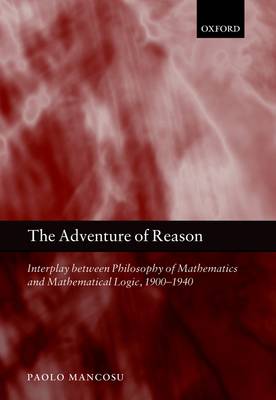
Door een staking bij bpost kan je online bestelling op dit moment iets langer onderweg zijn dan voorzien. Dringend iets nodig? Onze winkels ontvangen jou met open armen!
- Afhalen na 1 uur in een winkel met voorraad
- Gratis thuislevering in België vanaf € 30
- Ruim aanbod met 7 miljoen producten
Door een staking bij bpost kan je online bestelling op dit moment iets langer onderweg zijn dan voorzien. Dringend iets nodig? Onze winkels ontvangen jou met open armen!
- Afhalen na 1 uur in een winkel met voorraad
- Gratis thuislevering in België vanaf € 30
- Ruim aanbod met 7 miljoen producten
Zoeken
The Adventure of Reason
Interplay Between Philosophy of Mathematics and Mathematical Logic, 1900-1940
Paolo Mancosu
Hardcover | Engels
€ 210,45
+ 420 punten
Uitvoering
Omschrijving
Paolo Mancosu presents a series of innovative studies in the history and the philosophy of logic and mathematics in the first half of the twentieth century. The Adventure of Reason is divided into five main sections: history of logic (from Russell to Tarski); foundational issues (Hilbert's program, constructivity, Wittgenstein, Godel); mathematics and phenomenology (Weyl, Becker, Mahnke); nominalism (Quine, Tarski); semantics (Tarski, Carnap, Neurath). Mancosu exploits extensive untapped archival sources to make available a wealth of new material that deepens in significant ways our understanding of these fascinating areas of modern intellectual history. At the same time, the book is a contribution to recent philosophical debates, in particular on the prospects for a successful nominalist reconstruction of mathematics, the nature of finitist intuition, the viability of alternative definitions of logical consequence, and the extent to which phenomenology can hope to account for
the exact sciences.
the exact sciences.
Specificaties
Betrokkenen
- Auteur(s):
- Uitgeverij:
Inhoud
- Aantal bladzijden:
- 480
- Taal:
- Engels
Eigenschappen
- Productcode (EAN):
- 9780199546534
- Verschijningsdatum:
- 7/01/2011
- Uitvoering:
- Hardcover
- Formaat:
- Ongenaaid / garenloos gebonden
- Afmetingen:
- 249 mm x 180 mm
- Gewicht:
- 1292 g

Alleen bij Standaard Boekhandel
+ 420 punten op je klantenkaart van Standaard Boekhandel
Beoordelingen
We publiceren alleen reviews die voldoen aan de voorwaarden voor reviews. Bekijk onze voorwaarden voor reviews.











